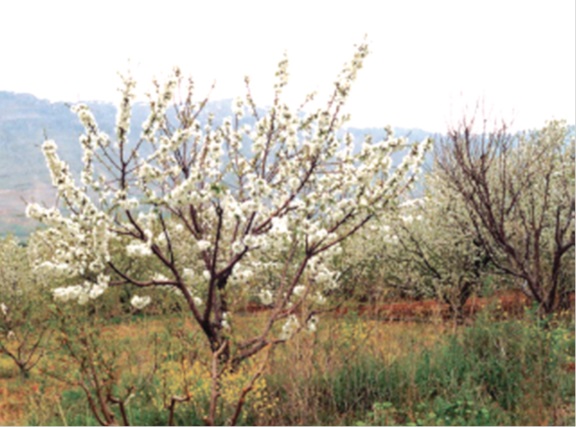Barada the divine gift to Damascus, a river, God offered to this city. Through this alliance between Barada and Damascus a captivating Ghouta has grown surrounding the city from three directions (east, west and south). Northern Ghouta stands as a range of mountains that extend to the borders of the governorate of Homs.
Damascus Ghouta was a connected range of orchards and fields that supplied the city with vegetables and fruits, until the invasion of the cement progress attacking parts of it and turning them into concrete blocks, factories and workshops of various industries. Despite that, remains of Ghouta are still considered the bread basket of the city, and one of the remarkable landmarks of tourism in the Governorate of Damascus Countryside.
 Every spring the Ghouta appears white clad with flowers of almond, apricot, apple, and peach trees .. In summer green veils picnickers protecting them from sun heat. While in fall, Ghouta is covered with a rainbow of colors of autumn leaves completing their life cycle and saying good bye to the visitors, with a promise to return to them again after the rain season when spring comes back.
Every spring the Ghouta appears white clad with flowers of almond, apricot, apple, and peach trees .. In summer green veils picnickers protecting them from sun heat. While in fall, Ghouta is covered with a rainbow of colors of autumn leaves completing their life cycle and saying good bye to the visitors, with a promise to return to them again after the rain season when spring comes back.
Spring is the season of picnics and trips to Damascenes. Most families spend the week preparing to spend the weekend in Ghouta orchards, making barbecues, while singing folkloric songs. As for children, they sit in seesaws installed on trees branches, playing all day long in green open space. So that spring weekends are turned into festivals.
Whereas, to enjoy the eastern Ghouta, visitors can start from south of Damascus, near the Eastern Gate (Bab Sharqi),and take al Mleiha road to drive on a paved highway with orchards on both sides for 20km the village of Marj al Sultan. Here visitors can notice the density of trees of various kinds: almond, apricot, peach, apple and olive. Because there are large numbers of visitors in spring days many orchard owners have turned parts of their properties into restaurants and public swimming pools. Some of these restaurants receive families who prefer to bring their own food only offering tables and chairs. Other proprietors built villas and farms for renting to tourists in the high season of tourism which starts in mid February and ends by the end of October. Major towns like Douma, Mleiha, Irbin, and villages like Kafar Batna and Babbila belong to eastern Ghouta.
Western Ghouta starts from al Rabweh, and extends west along the course of River Barada passing through Dummar, al Hameh, Ein al Khadra, Ein al Fijeh and the villages of Souk Wadi Barada to al Takieyeh. What distinguishes western Ghouta is that the seven tributaries of River Barada, as well as other water springs, run from different directions toward it. So, wherever you move you find water and trees around you.
 Ein al Fijeh source, springs from a mountain 820 m above sea level and is the main source of potable water for all the towns and villages of western Ghouta as well as Damascus city itself. On both sides of Barada and Fijeh rivers, local people built restaurants and cafes.
Ein al Fijeh source, springs from a mountain 820 m above sea level and is the main source of potable water for all the towns and villages of western Ghouta as well as Damascus city itself. On both sides of Barada and Fijeh rivers, local people built restaurants and cafes.
Southern Ghouta starts from the suburb of al Mazzeh, to Kafar Souseh and Daraya, Sahnaya, Ashrafieh and Sbeineh. Unfortunately this part of Ghouta was harshly invaded by concrete blocks and lost 50% of greenery.
Al Ghouta is as old as Damascus itself. It has may historical and archaeological sites like Tall al Salhieh, 15km east of Damascus which has ruins dating back to the old stone age. Tall Aswad, east of Damascus Airport which has ruins that date back to the ancient Neolithic age, the last of which discovered is a 7th century BC village whose residents used to mummify their dead in ways different from those of the pharaohs. In this hill many agricultural tools and remains of carbonized grain seeds were discovered, proof that the Ghouta was the first crib of agriculture in history, not to forget Tall Abou Soda in al Marj region and Tall al Azem in Hosh Rihana in addition to Roman and Islamic ruins in the villages of Jisreen and Ein Tarma. There are also several shrines and mausoleums in al Ghouta:the Shrine of Sayda Zainab in the village of Rawya, which took the name of Zainab, granddaughter of the prophet Mohammad, and the tombs of several companions of the prophet Mohammad in Daraya and Babbila and al Muaddamiyah.
Haifaa Mafalani

